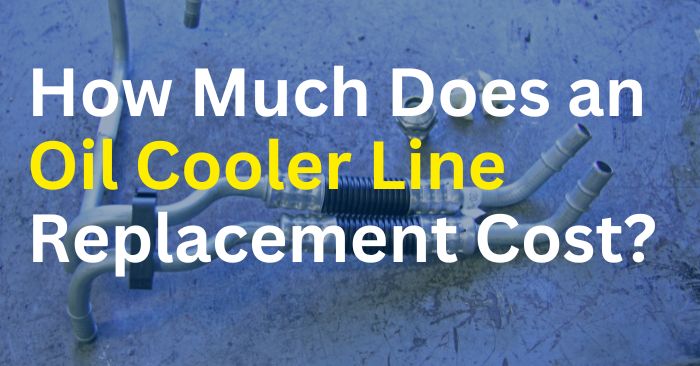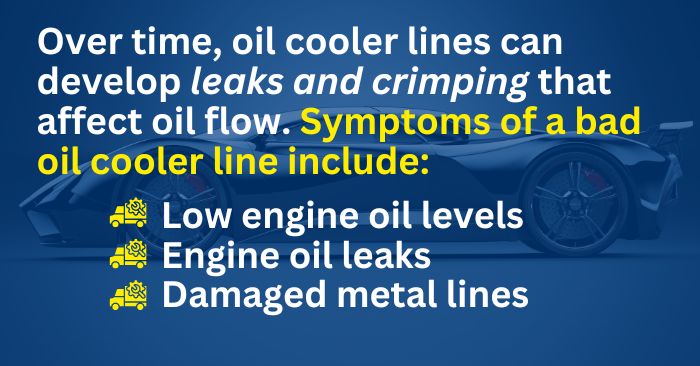
Written By: Jessica Anvar Stotz
Legally Reviewed By: Jessica Anvar Stotz

The cost of replacing an oil cooler line in 2024 varies nationally, typically ranging from $263 to $590, with an average cost of $422. This estimate encompasses both parts and labor.
Some estimates, however, suggest a lower range of $225 to $253, with parts averaging around $118 and labor costs between $106 and $134. Another source reports an average replacement cost of $168, breaking down to $49 for parts and $119 for labor.
These costs can fluctuate based on factors such as the vehicle’s make and model, the complexity of the oil cooler lines, the severity of the issue, and the location of the service provider. For further details on the total expense of oil cooler line replacement, continue reading.
What is the Average Oil Cooler Line Replacement Cost
Here is a table summarizing the average costs of some popular 2018-2022 vehicles:
| Vehicle Model | Parts Cost | Labor Cost | Total Estimate |
| 2022 BMW X5 | $140 | $150 – $180 | $290 – $320 |
| 2021 Chevrolet Silverado | $130 | $140 – $170 | $270 – $300 |
| 2020 Ford F-150 | $120 | $130 – $160 | $250 – $280 |
| 2019 Toyota Camry | $110 | $120 – $150 | $230 – $260 |
| 2018 Honda Accord | $100 | $110 – $140 | $210 – $240 |
Keep in mind that these figures represent average costs, and the actual price may differ depending on the complexity of the oil cooler lines and the extent of the issue.
In some cases, the cost can reach up to $400 based on these factors. For the most precise pricing, we highly recommend getting a personalized quote from a professional. These estimates are based on data available as of early 2024 and may be subject to change.
Is an Oil Cooler Line Covered by Warranty?
Coverage for an oil cooler line under warranty varies based on the type of warranty and its terms. Here’s a general overview:
- New Vehicle Warranty: If your vehicle is still under the manufacturer’s warranty, the oil cooler line may be covered, particularly if it falls under the powertrain or engine components category.
- Extended Warranty: If you have an extended warranty, it might include coverage for the oil cooler line, especially with a comprehensive plan.
- Used Vehicle Warranty: For used cars, the warranty coverage will depend on the conditions outlined at the time of purchase, which can differ significantly.
Typically, warranties do not cover parts that fail due to regular wear and tear or insufficient maintenance. Additionally, if the oil cooler line fails due to an accident or environmental factors, it may not be covered.
To confirm warranty coverage, review your vehicle’s warranty documentation or reach out to your dealership or warranty provider directly. Be sure to have your vehicle identification number (VIN) available when contacting them for precise information based on your warranty terms.

Vehicles Commonly Affected by Oil Cooler Line Problems
While any vehicle equipped with an oil cooler can experience problems, certain types of vehicles are more prone to oil cooler line issues. Typically, vehicles that operate under heavy-duty or high-performance conditions are more likely to have oil coolers. This includes:
- Semi-Trucks: Designed for extensive hauling and often operated in demanding conditions, these vehicles rely heavily on oil coolers to manage engine temperatures.
- Heavy-Duty Pickup Trucks: Especially those used for towing trailers or carrying heavy loads. These trucks need oil coolers to handle the extra stress placed on the engine.
- High-Performance Sports Cars: Built for speed and high RPMs, sports cars often have oil coolers to prevent overheating during high-performance driving.
Oil coolers play a crucial role in extending your vehicle’s engine life by reducing the risk of overheating. For instance, when hauling a trailer up a steep incline for extended periods, the engine operates at maximum capacity, generating significant heat. An oil cooler helps dissipate this heat, preventing engine temperatures from reaching dangerous levels.
Older vehicles are particularly susceptible to oil cooler line problems. However, newer models of the Mazda RX-8 have been known to experience issues where oil cooler lines can corrode and burst due to rust buildup, leading to oil leaks.
Recalls and Problems Due to Oil Cooler Lines
There have been several recalls and customer satisfaction programs released by auto manufacturers pertaining to oil cooler lines in various vehicles. Here are a couple notable examples:
- Chevrolet Silverado 1500 & GMC Sierra 1500 (2019): In June 2021, General Motors (GM) updated a customer satisfaction program to address a potential issue where engine oil cooler (EOC) lines might leak and detach from their crimp joints, particularly in cold weather. This could result in an oil leak and a sudden drop in oil pressure, which would trigger a warning on the driver information display. The resolution included replacing the engine oil cooler lines, oil, oil filter, and coolant.
- Daimler Freightliner Business Class M2 (2014-2019): Daimler Trucks release technical instructions for a special service recall campaign in 2021 affecting certain Freightliner trucks. Affected vehicles may have a manufacturing issue that could cause a small leak in the oil cooling system. Continuous operation under this condition might result in abnormal engine noise, illumination of the Malfunction Indicator Light (MIL), and an engine oil level low message.
Vehicle owners should stay informed about potential recalls affecting their vehicles. If you suspect there might be a recall or a problem with your vehicle, you can check the National Highway Traffic Safety Administration (NHTSA) recall check website or contact your vehicle’s manufacturer for the most current information. Remember to have your VIN number handy when inquiring about recalls.
Can I Fix or Replace an Oil Cooler Line on My Own?
Replacing an oil cooler line is a task that can be manageable for those with some mechanical expertise and the appropriate tools. However, there are several considerations to take into account before attempting this repair on your own:
- Experience Level: If you have a background in car maintenance and repairs, you may be able to handle the replacement. The process typically involves draining the oil, removing the old lines, and installing new ones.
- Required Tools: You’ll need specific tools such as wrenches, pliers, and possibly a lift or jack stands to access the vehicle’s underside safely.
- Time and Patience: Replacing an oil cooler line can be time-consuming and requires careful attention to detail to ensure all steps are completed correctly.
- Safety: Prioritize safety by securing the vehicle properly. Never work under a vehicle supported solely by a jack—use jack stands and wheel chocks to maintain stability.
If you are unsure of your skills or lack the necessary tools, it’s advisable to have a professional mechanic handle the job. They have the experience and equipment to perform the repair safely and accurately.
The Possibility of a Lemon Law Claim
When you buy or lease a new or used vehicle, you naturally expect it to be free of defects and dependable. However, if you find yourself frequently returning to the dealer for warranty repairs, particularly for significant issues like oil cooler line problems, your vehicle might be considered a “lemon.”
Lemon Laws are in place to protect consumers from defective vehicles that cannot be repaired after a reasonable number of attempts.
To be eligible for a Lemon Law claim, several conditions generally need to be met. The vehicle typically must have a defect covered by the warranty, that is repeatedly repaired during the warranty.
Additionally, you must have given the manufacturer a chance to repair the defect through a reasonable number of attempts. The defect should also significantly impair the vehicle’s use, value, or safety.
Filing a Lemon Law claim involves several steps. Begin by documenting everything related to the repairs. Keep detailed records of all repair attempts, including dates, issues, and how long the vehicle was in the shop.
Next, notify the manufacturer in writing about the defect and your intention to file a Lemon Law claim. Provide them with a final opportunity to fix the problem.
If the issue remains unresolved, consulting with a Lemon Law attorney is advisable. An attorney can help you evaluate your case and explore options such as a refund or a replacement vehicle.
The potential outcomes of a Lemon Law claim include receiving a replacement vehicle from the manufacturer, a refund of the purchase price with a deduction for the vehicle’s use, or, in some cases, cash compensation to settle the claim.
Keep in mind that Lemon Laws vary by state, so the specific criteria and procedures may differ depending on where you live.
If you suspect your vehicle might qualify as a lemon, it is recommended to consult with a legal expert specializing in Lemon Law claims to guide you through the process and ensure you understand your rights and options.
Connect with Our Qualified Lemon Law Attorneys
If you’re facing significant problems with your vehicle’s oil cooler components and haven’t resolved the issue through your dealership or manufacturer, seeking legal help may be the next step.
An experienced lemon law firm can assist you in obtaining cash compensation, a replacement vehicle, or a refund for the costs related to defective engine parts.
For California residents, or those who purchased or leased their vehicle in California, the Lemon Law Experts are here to help you review your options.
Since 2009, our team has dedicated itself to developing effective legal strategies for thousands of California consumers. We have a strong track record of winning lemon law cases for various vehicle brands, including Chevrolet, Toyota, Tesla, BMW, Honda, Polaris, and more
We offer a free consultation to thoroughly evaluate your case and help you understand your legal options. With our support, you can pursue the compensation and justice you are entitled to. Contact the Lemon Law Experts at 877.885.5366 today for a no-cost, no-obligation review of your situation.
Citations
National Highway Traffic Safety Administration (NHTSA). (2019). Technical Service Bulletin (TSB). Retrieved from https://static.nhtsa.gov/odi/tsbs/2019/MC-10171254-9999.pdf
National Highway Traffic Safety Administration (NHTSA). (2021). Technical Service Bulletin (TSB). Retrieved from https://static.nhtsa.gov/odi/tsbs/2021/MC-10200186-9999.pdf
National Highway Traffic Safety Administration (NHTSA). (2020). Technical Service Bulletin (TSB). Retrieved from https://static.nhtsa.gov/odi/tsbs/2020/MC-10172372-9999.pdf
National Highway Traffic Safety Administration (NHTSA). (2021). Recall Campaign Notice (RCMN). Retrieved from https://static.nhtsa.gov/odi/rcl/2021/RCMN-21V067-3815.pdf




